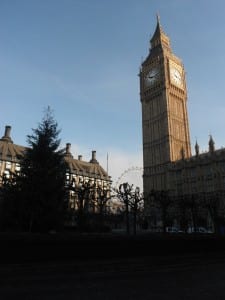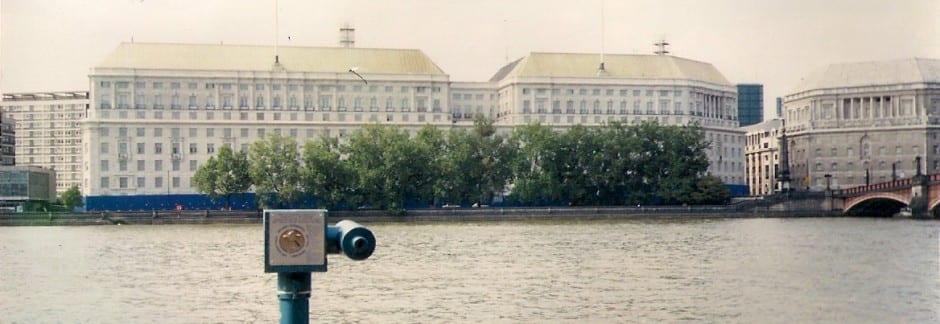 Nominations to the new Intelligence and Security Committee have, somewhat belatedly, been announced and approved by Parliament. This is the first time that membership of the ISC has been subject to parliamentary approval, although those nominated to serve on the committee are hand-picked by the Prime Minister in consultation with opposition leaders. The role of parliament is simply to approve or reject the PM’s nominations. Despite a belated attempt by the veteran Labour MP, David Winnick, to force a vote, nominations from the House of Commons were nodded through on Wednesday and those from the House of Lords are sure to follow a similar path.
Nominations to the new Intelligence and Security Committee have, somewhat belatedly, been announced and approved by Parliament. This is the first time that membership of the ISC has been subject to parliamentary approval, although those nominated to serve on the committee are hand-picked by the Prime Minister in consultation with opposition leaders. The role of parliament is simply to approve or reject the PM’s nominations. Despite a belated attempt by the veteran Labour MP, David Winnick, to force a vote, nominations from the House of Commons were nodded through on Wednesday and those from the House of Lords are sure to follow a similar path.
This is an improvement on the previous arrangements, in which ISC members were simply appointed by the Prime Minister, however, only a little. Allowing parliament to approve membership is a step towards making the committee more independent, but there is a widespread perception in parliament and beyond that successive governments have ensured that those selected to serve on the ISC could be relied upon not just to preserve the secrecy of the committee but also to avoid challenging the agencies too rigorously. I noted in an earlier post that ‘changes to the process by which members of the ISC are selected are unlikely to enhance the credibility of the committee unless there are also changes to the kind of individuals nominated to serve on the committee.’ It is far from clear that those nominated to serve on the current committee mark a break with tradition.
The tendency to appoint ISC members with Ministerial experience, particularly in related areas has led to criticism that those on the committee are too close to the agencies and/or the executive. Twenty-three of the thirty-nine parliamentarians who have served on the previous five committees since 1994 have held ministerial office before being appointed to the committee, with a clear preference for members with ministerial experience in defence, foreign affairs and Northern Ireland. In addition appointments from the House of Lords have included individuals with direct experience of working with the intelligence agencies including a former diplomat, a retired Cabinet Secretary, and a former member of the Secret Intelligence Service.
Those nominated to the committee this week follow a similar pattern. Six of the nine committee members have previously held Ministerial office, although only one, Dominic Grieve, has been a Cabinet Minister, while the new Peer appointed to the committee is a former member of the Foreign Office.
However, in terms of previous experience of the committee this is the most inexperienced ISC since the first one was established in 1994. The ISC is reconstituted in each new parliament with a combination of new and experienced members. When the second committee was formed in 1997, the Labour government decided to retain the services of Tom King as chair in order to provide an important element of continuity. Barry Jones, Michael Mates and Alan Beith were also all retained from the first committee. Michael Mates served on three committees from 1994 t0 2005, and Alan Beith, the longest-serving ISC member to date, remained on the committee until midway through the 2010 parliament. Allowing members to remain on the committee for several terms is not unequivocally a good thing, but it does provide important institutional memory. In general at least three members have been retained after each general election.
Four members of the current committee have been retained from the previous parliament, although only two of those served for the whole parliament. The Labour MP, George Howarth is now the longest serving member of the current committee having served on the ISC through both the 2005-2010 and 2010-2015 parliaments. The other long-serving member of the committee, Michael Ancram, now the Marquess of Lothian, was appointed to the ISC in 2006 following the departure of James Arbuthnot, and has the singular distinction of having served on the committee as a member of the House of Commons and the House of Lords.
Two other members are retained from the previous committee but both were appointed towards the tail-end of the parliament. The Labour MP, Fiona Mactaggart replaced Paul Goggins who died in January 2014. She was the first member to be elected under the new system for selecting members of the ISC. The Conservative MP, Keith Simpson, was, somewhat bizarrely, nominated to the committee in March of this year, when the Conservative MP, Julian Lewis stepped down in the dying days of the last parliament. Although the committee had, by that point, effectively completed its business for the parliament, Mr Lewis somewhat presumptively observed, ‘when it was put to me that it would assist my right hon. Friend the Member for Broadland (Mr Simpson) to get his feet under the table, even for the last few days of this Parliament, I was only too happy to accommodate him.’ Given that the ISC announced in February that it had no further scheduled meeting before the election, it is possible that Mr Simpson has not yet attended a meeting of the committee.
Keith Simpson is a genial and intelligent MP. An accomplished military historian who has lectured at Sandhurst and Cranfield and a former PPS to William Hague, during his time as Foreign Secretary. His in-depth knowledge could be an asset to the committee. However, he is not, perhaps, the kind of MP to challenge the agencies too strongly and his presence on the committee is unlikely to convince those in parliament who feel that the ISC has been too quick to accept the agencies’ explanation of events.
The most interesting of the new appointments is Dominic Grieve. Grieve, a former barrister, was Attorney General from 2010 until July 2014, a position which also gave him a seat on the National Security Council. Following his unwelcome departure from government he has been a vocal and intelligent critic of the Conservatives’ plans to replace the Human Rights Act. In 2014 he was awarded a lifetime achievement award by Liberty . It his hard to think of a more welcome addition to the committee from the Conservative benches. Given his experience and seniority Grieve is a likely candidate for chair of the committee. However, his nomination to the committee does perhaps reinforce the impression, which was allowed to develop under the previous Labour government, that membership of the ISC is compensation for those losing Ministerial office. Moreover, while his experience means that he is likely to play a central role in any investigation of intelligence-led drone strikes, his recent involvement in reviewing and perhaps approving such operations may well lead to accusations of conflict of interest.
Sir Alan Duncan, is another long-serving and highly able Conservative MP. He served as Minister for International Development in the last Parliament, leaving the government in the same reshuffle as Grieve – an unfortunate pattern. He is socially liberal and has a close interest in foreign affairs. Unusually for a prominent Conservative, he has publicly criticised Israeli settlements on Palestinian territory and the international arms trade. To what extent his previous posts have brought him into contact with British intelligence is not clear, but in 2010, drawing on the WikiLeaks cables, The Guardian reported that US intelligence had drafted a dossier on his political aspirations.
Unsurprisingly, there are now no Liberal Democrats on the committee, but the ISC does have its first SNP member, Angus Robertson, the MP for Moray. Robertson is a long-serving SNP MP with a long-standing interest in defence and foreign affairs, having been the SNP’s Westminster spokesperson on these issues since 2001. Robertson is perhaps most likely to offer a critical voice on the committee. He took a close interest in Britain’s involvement in the US rendition programme, providing a detailed dossier on suspect US flights through Scotland to Dick Marty, the Council of Europe’s special rapporteur looking at the role of European states in rendition. Robertson heralded his appointment to the ISC in this week’s Prime Minister’s Questions by asking about the role of the committee would play in investigating drone strikes.
The only new Labour member of the committee is Gisela Stuart, the MP for Edgbaston. Unusually for an ISC member, Stuart has not held a senior ministerial office, although she did serve as a junior health minister for two years at the end of the 1997-2001 parliament. She has, however, carved out a reputation as an expert on foreign affairs with long service on the select committees for foreign affairs (2001 – 2010) and defence (2010 to 2015). This will have brought some contact with the intelligence agencies, including briefings from agency heads. It would be welcome if she were able to encourage the ISC to liaise more closely and effectively with those parliamentary select committees with overlapping agendas.
Stuart and Fiona Mactaggart are the only women on the committee. A total of ten women have served on the ISC since it was first established in 1994 and thirty-four men. There have never been more than two women on the ISC at any one time and all of the women who have served on the committee have been Labour members. I have discussed this elsewhere, but it is a shame that another opportunity to provide some gender balance on the committee has been missed.
There are once again two Peers on the Committee. Although the ISC is by statute a joint committee of both Houses, the first four committees, from 1994 to 2010, had only one Peer on each. In 2010, two Peers were appointed to the committee, the Conservative Peer Lord Lothian and the crossbencher, Lord Butler. This did attract opposition from the Labour Party who objected to the presence of a crossbench Peer rather than a Labour Peer to balance the Conservative representation from the Upper House. Nevertheless, this precedent has been followed in the new committee. The Marquess of Lothian remains on the committee and Lord Butler has been replaced by another crossbench Peer, Lord Janvrin.
Disquiet about Lord Butler’s appointment to the previous committee also reflected concern that, as a former Cabinet Secretary, he was perhaps too close to the agencies. In the course of our research one member of the previous committee observed that Lord Butler was just the kind of individual who should not serve on the ISC. Such concerns are unlikely to be alleviated greatly by the appointment of Lord Janvrin, who, if it is possible, could be described as even more of an ‘establishment’ figure than Lord Butler. Prior to his elevation to the House of Lords in 2007, Janvrin was Private Secretary to the Queen. However, it was probably his career in the Foreign Office in the 1970s and 80s which marked him out as a potential candidate for membership of the ISC. As is often the case with ISC members, his experience may be valuable, but his nomination is unlikely to persuade the sceptics that the ISC is embarking on a new period of penetrating and robust oversight.
Under arrangements introduced in the last Parliament, for the first time the chair of the ISC will be chosen by its members from the membership of the committee. There are a number of obvious candidates. As the longest-serving member and an opposition MP, George Howarth would be an appropriate choice. As would Lord Lothian, although the committee may wish to avoid selecting a chair from the House of Lords. Of the new appointees, Dominic Grieve and Alan Duncan are the obvious candidates. As the only former Cabinet Minister on the committee Grieve would seem to be in a stronger position, all but one of the previous six ISC chairs have been former Cabinet Ministers. Grieve might also be a popular choice from outside the committee.
One interesting break with tradition in relation to this round of ISC appointments is that, those who are not already members, have been appointed to the Privy Council. There is a widespread, but mistaken, assumption that membership of the ISC and the Privy Council go hand in hand. To be sure, membership of the Privy Council, and indeed the House of Lords, has often been a reward for service on the ISC, but it has not in the past been automatic. Michael Mates served on the ISC for ten years before becoming a Privy Counsellor. Julian Lewis, was made a member on his departure from the committee in March, others have served on the committee without becoming Privy Counsellors. It is not clear then why a change to this practice has occurred. It hardly seems likely, at this stage, that the Privy Council oath is deemed necessary to ensure the secrecy of the committee’s work. The Prime Minister, who has a penchant for distributing the baubles of state, may be seeking to enhance the status of the committee and perhaps makes membership more attractive. Ministers are fond of pointing out that the ISC is a ‘senior committee’ and this change may be designed to lend their reports the added authority of being produced by a committee of Privy Counsellors. Whatever the reason, with the exception of a short period in 2004 – 05, this will be the first time that the entire membership of the ISC are Privy Counsellors.
Despite some significant changes to the process of appointing members, and while there have clearly been some interesting appointments this time around, it is hard to avoid the conclusion that, with the possible exception of Angus Robertson, those nominated to serve on the ISC are exactly the kind of MPs and Peers one would expect to be nominated to serve on the ISC. Of course the new committee should be judged on its work, and not its membership, but as the previous chair, Malcolm Rifkind observed at the beginning of the last parliament, it is not sufficient for the ISC to be independent it must also be perceived to be independent ‘both by Parliament and the public.’ Consequently, public and parliamentary perceptions about the kind of people selected to serve on the committee do matter. Unfortunately, it is far from clear that those appointed to the committee this week will inspire any more confidence than their predecessors.


